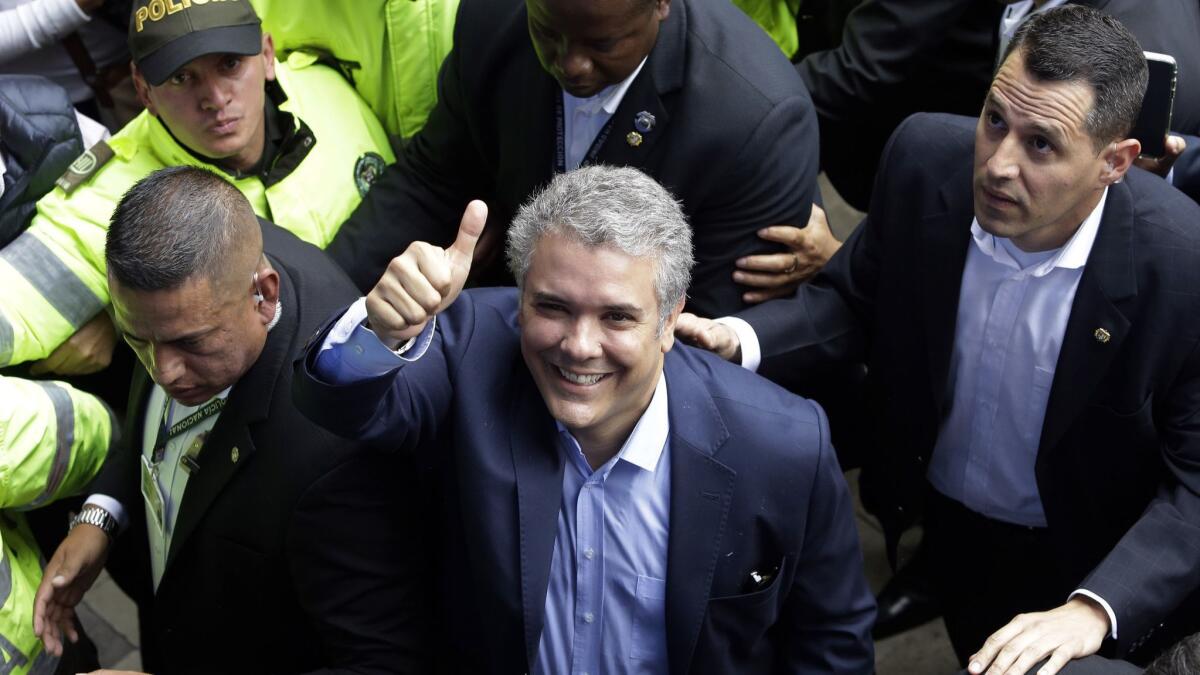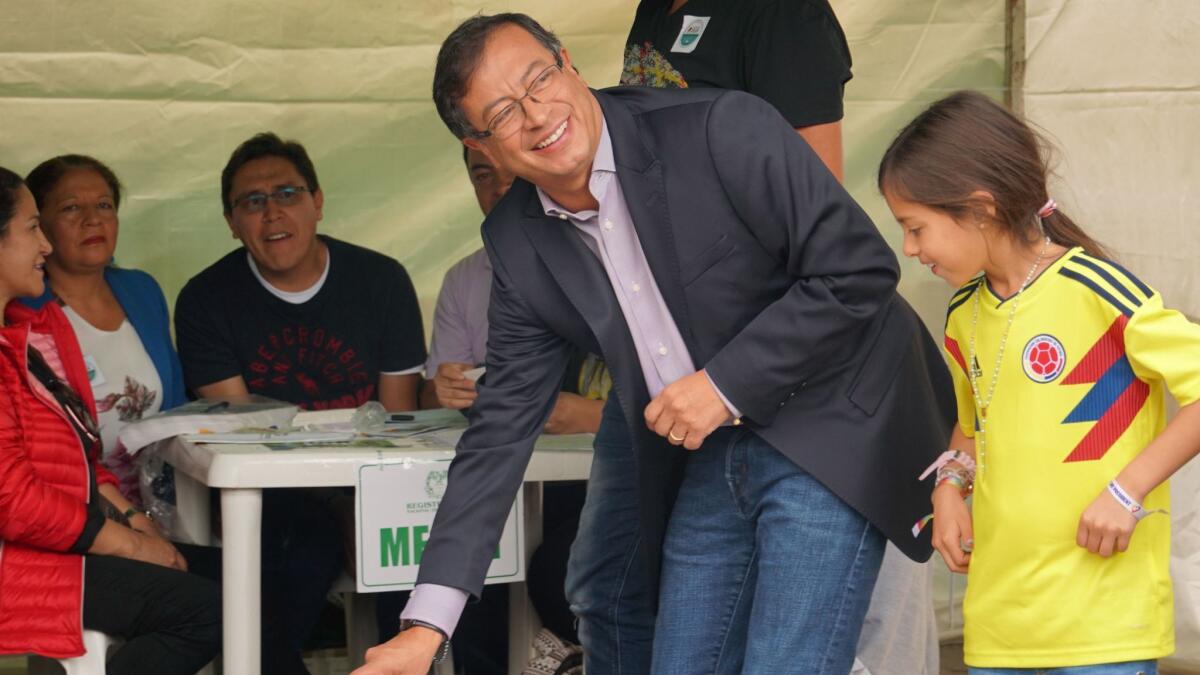Colombia’s presidential race heads for a June runoff between conservative Duque and leftist Petro

- Share via
Reporting from Bogota, Colombia — A hard-line stance toward demobilized Colombian rebels helped conservative presidential candidate Ivan Duque mount a formidable lead in Sunday’s election, though not enough to avoid a runoff in June.
Duque, a former senator backed by former President Alvaro Uribe, was expected to face leftist former guerrilla and ex-Bogota Mayor Gustavo Petro in a second round of voting June 17 to determine who would capture the presidency. The two men represent opposite views of a landmark 2016 peace agreement between the Colombian government and the rebel group known as the Revolutionary Armed Forces of Colombia, or FARC.
In addition to addressing the already shaky peace agreement, the next president will face challenges including corruption, crime and economic development.
With nearly all ballots counted, Duque was leading the race with 39% of the vote, short of the 50% plus one needed to avoid a runoff, according to early results. Petro was in second place with 25% of the vote, narrowly ahead of third-place finisher Sergio Fajardo, the former mayor of Medellin, who received 24%.
Duque and Petro appeared headed for a high-stakes runoff that will present voters with stark alternatives. The future of the already shaky peace accord with FARC rebels signed in 2016 could hang in the balance as Duque has proposed changes to provisions of the deal that demobilized rebel leaders have said are unacceptable, while Petro supports the agreement.
Sunday’s turnout was on track to surpass 50%, exceeding the 2014 election’s first round when only 40% of eligible voters cast ballots in a contest ultimately won by Juan Manuel Santos. Turnout at the Corferias convention center complex, Bogota’s largest polling place, was described by officials as “massive.”

Duque is a 41-year-old economist with graduate degrees in economics and public administration from Georgetown University and American University. In addition to changes to the 2016 peace accord to require ex-combatants to serve jail terms for heinous crimes, he promised economic measures to restart the sluggish Colombian economy.
The peace accord with FARC brought an end to a 52-year-old civil conflict, with about 7,700 rebels laying down their arms. The rebels were guaranteed 10 seats in Congress, economic incentives and light maximum sentences for war crimes. Colombia has seen a sharp drop in homicides and kidnappings since negotiations began in 2012.
But the deal was opposed by many Colombians as too generous to the rebels, and it was narrowly rejected in an October 2016 plebiscite. Santos subsequently ramrodded the deal through Congress, earning a Nobel Peace Prize and international kudos but deep unpopularity on his home turf.
Rosario Villaveces, a graphic designer in Bogota, said she voted for Duque in large part because of the peace deal changes he promised.
“I agree that there should be amendments to make it more fair, that they pay for the crimes they committed, that their actions have consequences,” said Villaveces, 58. “Now, that’s not so clear.”
Duque’s most attractive attribute for many voters is the seal of approval he received from Uribe, a senator who was president from 2002 to 2010 and who remains Colombia’s most popular and influential politician. Uribe handpicked Duque as the candidate of his Democratic Center party, the Colombian Congress’ most powerful faction.
“I like Duque because he has Uribe’s support, and I like Uribe’s approach to peace in that it should have been won with the armed forces, not with peace negotiations,” said Charlotte Graham, 24, an engineering student at the University of the Andes in Bogota. “The peace deal has been too easy on the FARC after all the crimes they committed.”
Petro, 58, is a former member of the M19 guerrilla force that demobilized in 1990. He gained national fame as a senator denouncing paramilitarism and politicians who profited from it. He also served a controversial term as Bogota mayor. He has promised to promote ways of lessening Colombia’s economic inequality, which economists say is at the root of Colombia’s civil conflicts.
Petro draws much of his support from the courageous reformer image he fashioned as senator. He also has promised to combat Colombia’s rampant and systemic corruption, which has disillusioned many Colombians hardened by spectacular cases of politician malfeasance.
“These nearly 5 million votes were cast by the young, the disadvantaged and the marginalized who decided to say, we are here to make decisions in favor of a more equal society,” Petro said to supporters in Bogota after the results were known.
But many Colombians are wary of Petro’s past association and friendship with late Venezuelan President Hugo Chavez. During the campaign, his opponents tried to stigmatize him as a “Castro-Chavista” candidate who would take Colombia down the path to socialism. The issue is a potent one in Colombia, which has witnessed firsthand neighboring Venezuela’s economic collapse and rising tide of emigration.
“We can’t go the way of Venezuela, which is where Petro would take us,” said Jaime Aguilar, 52, a retired police officer. “Anyone with any property would not be safe. They’d have it confiscated by the government like Chavez did. Duque also will be better for the armed forces and the police in bringing back better security that we have lost with Santos.”
Some voters said they favored the centrist Fajardo, who finished in third place. Fajardo helped turn Medellin around from the chaos and crime generated by drug trafficking with innovative urban development and public works programs.
Alexander Rodriguez, a 40-year-old chauffeur, said he had favored Fajardo because he saw him as a unifier.
“I like his ideals and the fact that education is what is important to him, I don’t see either Duque or Petro as capable of leading the country because they are too extreme. I prefer someone more in the center.”
Duque and Petro will have less than a month before the runoff to broaden their appeal and form alliances. Key to each candidate will be efforts to attract supporters of losing candidates, including Fajardo, former Sen. German Vargas Lleras (7%) and former Vice President Humberto de la Calle (2%).
Kraul is a special correspondent.
More to Read
Sign up for Essential California
The most important California stories and recommendations in your inbox every morning.
You may occasionally receive promotional content from the Los Angeles Times.













